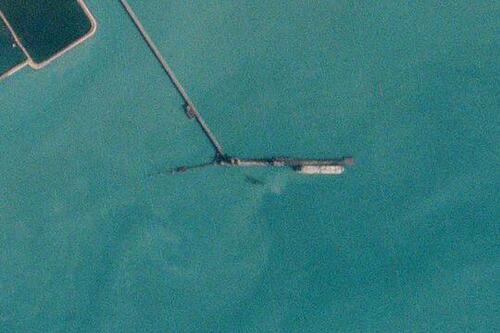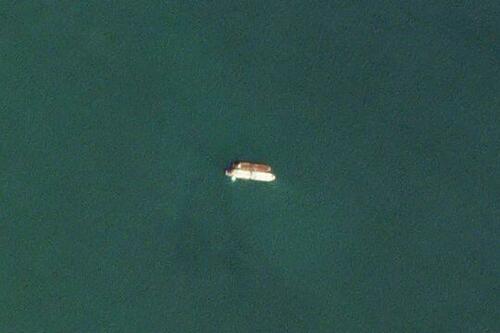
The Biden administration is discussing sanctions against a United Arab Emirates-based businessman and a constellation of companies suspected of helping Iran export oil by using ship-to-ship transfers of oil in waters between Iraq and Iran, then forging documents to pass the cargo off as Iraqi to avoid Western sanctions, the Wall Street Journal reports.
The new sanctions would be part of a broader effort to apply pressure on Tehran amid a push to revive a deal on Iran's nuclear program.

That said, plans to target sanctions-evasion have posed a dilemma for the Biden administration, which is trying to avoid further blame for scorching inflation that has been exacerbated by sanctions against oil-exporting Russia, according to current and former officials.
That said, a State Department spokesman told the Journal that "Any speculation that the administration is withholding sanctions on Iran to avoid supposed inflationary effects is equally false."
Since the nuclear talks stalled earlier this year, the Biden administration has levied two rounds of sanctions against companies it alleges are smuggling Iranian oil, an escalation designed to remind Iran of the costs of failing to negotiate. Still, some current and former U.S. officials say the Biden administration has held at bay a full-scale enforcement campaign in order to revive the nuclear agreement, which President Trump pulled out of in 2018. -WSJ
Former National Security Council director for Middle East policy, Robert Greenway, says Iran's sanctions-evasion through Iraq - including blending oil to hide its origin - constitutes up to 25% of Tehran's exports.
"It mattered a great deal to Tehran, especially as Iran was under significant market pressure," said Greenway, who now works at the Hudson Institute.
Interestingly, Western companies such as Exxon, Koch Industries, and Shell PLC were involved in the blended-oil transactions according to the documents and former employees - as these companies "either conducted transactions for the firms involved in blending the oil, acted as third-party shipping brokers or bought the blended oil."
.@UANI's @claire_jungman has detailed these very practices in a new report:https://t.co/lduRwcT1TC
— Jason Brodsky (@JasonMBrodsky) July 31, 2022
The Journal notes that there are no allegations that Western firms intentionally violated sanctions. While Exxon and Koch didn't respond to inquiries, Shell says they're analyzing past data in an attempt to assess their alleged involvement, and that the company is committed to being "wholly compliant with all applicable international laws, trade controls and sanctions."
The man in question behind the oil-blending operation is believed to be Salim Ahmed Said, and Iraqi-born UK citizen. The companies, which share email and corporate addresses with Said's firms, including Al-Iraqia Shipping Services & Oil Trading FZE, known as AISSOT.
Said told the Journal via email that he doesn't own AISSOT, nor does he violate US sanctions against Iran with any of his companies.
"I am the owner of Ikon Petroleum and Rhine Shipping. I am not the owner of Aissot," he said. "My companies have not shipped Iranian oil in violation of U.S. sanctions at all and all my trades with Iraq were entirely legitimate."
Corporate documents show that Said is not an AISSOT official or owner, however 'numerous former senior employees said that Mr. Said controls the company,' per the Journal.

According to former employee Muhanad Alwan, Said "is running the whole show," adding that he was hired to head AISSOT's Iraq operations until mid-2020. Alwan said that Said told him Iranians also have an ownership interest in AISSOT.
Mr. Alwan, the former head of AISSOT’s Iraq operations, said most of the blended oil on the ship was from Iran, and its origin was hidden with fake documentation.
“Smugglers get Iraqi or Omani documents for Iranian smuggled oil products,” Mr. Alwan said.
One of the vessels believed to be involved was a tanker called the Babel, which shipping data shows was operated between 2017 and August 2020 by Rhine Shipping DMCC, a company owned by Mr. Said. AISSOT chartered the Babel for its operations during that time, according to the people familiar with the matter, former employees and shipping data. -WSJ
In March 2020, the Iran-owned Polaris 1 tanker loaded the Babel with 231,000 barrels of fuel oil - worth around $9 million at the time - in a ship-to-ship transfer. That same month, separate shipping data show the Babel delivered fiel oil in Iraqi waters to the Da Li Hu tanker, owned by a subsidiary of China's state-owned (and then-sanctioned) shipping giant.
"Salim [Said] was the boss," said another person 'with direct knowledge' of AISSOT's operations.
Said's businesses, including Ikon Petroleum, are primary contractors for AISSOT operations, and share both senior management and addresses, according to former employees and confirmed by corporate documents and property records.
According to Western officials, Said's alleged sanctions-evasion began shortly after the Trump administration announced it was considering reimposing sweeping sanctions against Iran in mid-2017.
Around the time of that announcement, Iraq’s then oil minister, Jabbar Ali Hussein Al Luaibi, helped create a new company as the sole exporter of the country’s oil. The company, AISSOT, was a joint venture between the state-owned Iraqi Oil Tankers Company and the Arab Maritime Petroleum Transport Company, whose primary owners include several Gulf countries, according to the people and documents.
Mr. Luaibi said at the time that the joint venture would make Iraq a major international player in the energy shipping sector. Current and former U.S. and Iraqi officials say the venture was really a vehicle to help Iran export oil. -WSJ
"They’re exporting Iraqi energy products, but the real bread and butter of the business was the five to ten percent of Iranian oil exports, fuel oil exports and other exports," said a former Western official of AISSOT's operations.
AISSOT, meanwhile, claimed in a 2020 statement that neither they, nor their affiliates, were involved in any sanctioned activities - including the Iranian energy trade - calling allegations "baseless and false."
The Biden administration is discussing sanctions against a United Arab Emirates-based businessman and a constellation of companies suspected of helping Iran export oil by using ship-to-ship transfers of oil in waters between Iraq and Iran, then forging documents to pass the cargo off as Iraqi to avoid Western sanctions, the Wall Street Journal reports.
The new sanctions would be part of a broader effort to apply pressure on Tehran amid a push to revive a deal on Iran’s nuclear program.

That said, plans to target sanctions-evasion have posed a dilemma for the Biden administration, which is trying to avoid further blame for scorching inflation that has been exacerbated by sanctions against oil-exporting Russia, according to current and former officials.
That said, a State Department spokesman told the Journal that “Any speculation that the administration is withholding sanctions on Iran to avoid supposed inflationary effects is equally false.”
Since the nuclear talks stalled earlier this year, the Biden administration has levied two rounds of sanctions against companies it alleges are smuggling Iranian oil, an escalation designed to remind Iran of the costs of failing to negotiate. Still, some current and former U.S. officials say the Biden administration has held at bay a full-scale enforcement campaign in order to revive the nuclear agreement, which President Trump pulled out of in 2018. -WSJ
Former National Security Council director for Middle East policy, Robert Greenway, says Iran’s sanctions-evasion through Iraq – including blending oil to hide its origin – constitutes up to 25% of Tehran’s exports.
“It mattered a great deal to Tehran, especially as Iran was under significant market pressure,” said Greenway, who now works at the Hudson Institute.
Interestingly, Western companies such as Exxon, Koch Industries, and Shell PLC were involved in the blended-oil transactions according to the documents and former employees – as these companies “either conducted transactions for the firms involved in blending the oil, acted as third-party shipping brokers or bought the blended oil.”
.@UANI‘s @claire_jungman has detailed these very practices in a new report:https://t.co/lduRwcT1TC
— Jason Brodsky (@JasonMBrodsky) July 31, 2022
The Journal notes that there are no allegations that Western firms intentionally violated sanctions. While Exxon and Koch didn’t respond to inquiries, Shell says they’re analyzing past data in an attempt to assess their alleged involvement, and that the company is committed to being “wholly compliant with all applicable international laws, trade controls and sanctions.”
The man in question behind the oil-blending operation is believed to be Salim Ahmed Said, and Iraqi-born UK citizen. The companies, which share email and corporate addresses with Said’s firms, including Al-Iraqia Shipping Services & Oil Trading FZE, known as AISSOT.
Said told the Journal via email that he doesn’t own AISSOT, nor does he violate US sanctions against Iran with any of his companies.
“I am the owner of Ikon Petroleum and Rhine Shipping. I am not the owner of Aissot,” he said. “My companies have not shipped Iranian oil in violation of U.S. sanctions at all and all my trades with Iraq were entirely legitimate.”
Corporate documents show that Said is not an AISSOT official or owner, however ‘numerous former senior employees said that Mr. Said controls the company,’ per the Journal.

According to former employee Muhanad Alwan, Said “is running the whole show,” adding that he was hired to head AISSOT’s Iraq operations until mid-2020. Alwan said that Said told him Iranians also have an ownership interest in AISSOT.
Mr. Alwan, the former head of AISSOT’s Iraq operations, said most of the blended oil on the ship was from Iran, and its origin was hidden with fake documentation.
“Smugglers get Iraqi or Omani documents for Iranian smuggled oil products,” Mr. Alwan said.
One of the vessels believed to be involved was a tanker called the Babel, which shipping data shows was operated between 2017 and August 2020 by Rhine Shipping DMCC, a company owned by Mr. Said. AISSOT chartered the Babel for its operations during that time, according to the people familiar with the matter, former employees and shipping data. -WSJ
In March 2020, the Iran-owned Polaris 1 tanker loaded the Babel with 231,000 barrels of fuel oil – worth around $9 million at the time – in a ship-to-ship transfer. That same month, separate shipping data show the Babel delivered fiel oil in Iraqi waters to the Da Li Hu tanker, owned by a subsidiary of China’s state-owned (and then-sanctioned) shipping giant.
“Salim [Said] was the boss,” said another person ‘with direct knowledge’ of AISSOT’s operations.
Said’s businesses, including Ikon Petroleum, are primary contractors for AISSOT operations, and share both senior management and addresses, according to former employees and confirmed by corporate documents and property records.
According to Western officials, Said’s alleged sanctions-evasion began shortly after the Trump administration announced it was considering reimposing sweeping sanctions against Iran in mid-2017.
Around the time of that announcement, Iraq’s then oil minister, Jabbar Ali Hussein Al Luaibi, helped create a new company as the sole exporter of the country’s oil. The company, AISSOT, was a joint venture between the state-owned Iraqi Oil Tankers Company and the Arab Maritime Petroleum Transport Company, whose primary owners include several Gulf countries, according to the people and documents.
Mr. Luaibi said at the time that the joint venture would make Iraq a major international player in the energy shipping sector. Current and former U.S. and Iraqi officials say the venture was really a vehicle to help Iran export oil. -WSJ
“They’re exporting Iraqi energy products, but the real bread and butter of the business was the five to ten percent of Iranian oil exports, fuel oil exports and other exports,” said a former Western official of AISSOT’s operations.
AISSOT, meanwhile, claimed in a 2020 statement that neither they, nor their affiliates, were involved in any sanctioned activities – including the Iranian energy trade – calling allegations “baseless and false.”






